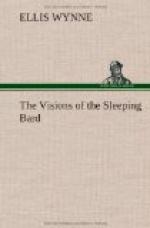The leading feature of the Visions, namely the personal element which the Author infuses into the recital of his distant travels, brings the reader into a closer contact with the tale and gives continuity to the whole work, some parts of which would otherwise appear disconnected. This telling of the tale in propria persona with a guide of shadowy or celestial nature who points out what the Bard is to see, and explains to him the mystery of the things around him, is a method frequently adopted by poets of all times. Dante is the best known instance, perhaps; but we find the method employed in Welsh, as in “The Dream of Paul, the Apostle,” where Paul is led by Michael to view the punishments of Hell (vide Iolo MSS.). Ellis Wynne was probably acquainted with Vergil and Dante, and adopted the idea of supernatural guidance from them; in fact, apart from this, we meet with several passages which are eminently reminiscent of both these great poets.
But now, casting aside mere speculation, we come face to face with the indisputable fact that Ellis Wynne is to a considerable degree indebted to the Dreams of Gomez de Quevedo y Villegas, a voluminous Spanish author who flourished in the early part of the 17th century. In 1668, Sir Roger L’Estrange published his translation into English of the Dreams, which immediately became very popular. Quevedo has his Visions of the World, of Death and her (sic) Empire, and of Hell; the same characters are delineated in both, the same classes satirized, the same punishments meted out. We read in both works of the catchpoles and wranglers, the pompous knights and lying knaves—in fine, we cannot possibly come to any other conclusion than that Ellis Wynne has “read, marked and inwardly digested” L’Estrange’s translation of Quevedo’s Dreams. But admitting so much, the Bardd Cwsc still remains a purely Welsh classic; whatever in name and incident Ellis Wynne has borrowed from the Spaniard he has dressed up in Welsh home-spun, leaving little or nothing indicative of foreign influence. The sins he preached against, the sinners he condemned, were, he knew too well, indigenous to Welsh and Spanish soil. George Borrow sums up his comments upon the two authors in the following words: “Upon the whole, the Cymric work is superior to the Spanish; there is more unity of purpose in it, and it is far less encumbered with useless matter.”
The implication contained in the foregoing remarks of Borrow—that the Bardd Cwsc is encumbered to a certain degree with useless matter, is no doubt well founded. There is a tendency to dwell inordinately upon the horrible, more particularly in the Vision of Hell; a tiring sameness in the descriptive passages, an occasional lapse from the tragic to the ludicrous, and an intrusion of the common-place in the midst of a speech or a scene, marring the dignity of the one and the beauty of the other.




